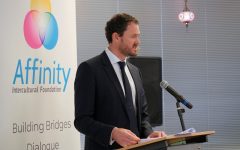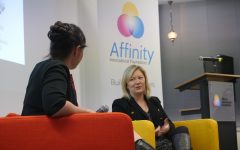Farah Anwar Pandith – “Generation Change”
April 5, 2011 2022-05-16 5:47Farah Anwar Pandith – “Generation Change”

On the 3rd of April 2011, Ms Farah Pandith addressed a diverse audience on “Generation Change” at the Affinity Centre.
Ms Pandith is the Special Representative to Muslim Communities in the US and has been involved in many issues and projects throughout her career affecting Muslim communities around the world. She reports to the Secretary of the State, Senator Hillary Clinton. Her unique role in the US government as a special representative to Muslim communities shows their administrations desire to engage with Muslims on a grassroots and organisational level to tackle the major issues encountered by Muslim communities.
The evening began with an outline of the place of Islam in American history and culture by the MC for the night, Mr Osman Karolia. Mr Karolia highlighted the historical dimension of Islam dating back to at least the arrival of the slaves. He also mentioned the great number of Islamic schools and community centres in USA and provided a brief comparison with the figures in Australia.

In her speech, Ms Pandith emphasised the dialogue based nature of her work. She stressed the importance to listen and engage with as many diverse people and communities as possible. She drew upon her experiences in connecting with community groups, schools, artists, business and faith leaders around the world.
Ms Pandith highlighted the importance of the youth demographic in her work and explored the impact of media, technology and culture in shaping the way young people define their identity; the way they build networks or communities and deal with discrimination. She shared her observations of a ‘youthquake’- young people wary of being defined or labelled by others and wanting to be heard. It is this generation that she calls ‘generation change’.
She has a strong desire to listen to young people and assist wherever she can. She held a private discussion with a group of young Muslim Australians.
Ms Pandith ended her speech with an interactive session addressing their questions. The audience’s input ranged from the USA’s international politics to restoring the hope of Muslim youth. For the former, she denied that the US was at war with Islam and pointed to the many freedoms enjoyed by Muslims living in America as opposed to other countries. For the latter, she emphasised on the importance of peer-to-peer communication and taking an initiative to explore, define, and celebrate identity.
 A question was posed to her asking her “how do you build trust” to which she answered by establishing mutual respect and building long-term relationships in a time of non-crisis.
A question was posed to her asking her “how do you build trust” to which she answered by establishing mutual respect and building long-term relationships in a time of non-crisis.
Her analysis of the difference between pre and post 9-11 stages was also interesting. Although there could be a lot of negative portrayal, there was higher demand for information about other faiths, not just Islam, and an increase in faith movements almost to the degree of an industry in their education.
The President of Affinity Intercultural Foundation, Mr Mehmet Saral delivered a vote of thanks in which he drew on the similarities between Ms Pandith’s work and that of Affinity. Both are essentially involved in dialogue and building bridges. Both aim to bring communities closer and increase awareness and tolerance within the wider community.





